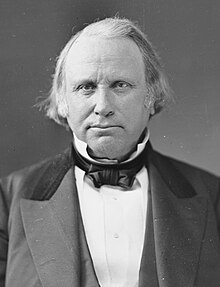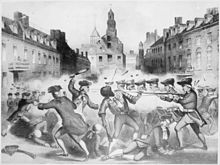Henry Wilson
vice president of the United States from 1873 to 1875
Henry Wilson (16 February 1812 – 22 November 1875) was an American politician from the U.S. state of Massachusetts during the 19th century. He served as the vice president of the United States under Ulysses S. Grant from March 1873 until his death in November 1875. A Republican, he supported the abolition of slavery and supported civil rights for African Americans.



Quotes
edit"Debate with Jefferson Davis"
editHenry Wilson. "Debate with Jefferson Davis," as quoted in: Harry V. Jaffa. A New Birth of Freedom: Abraham Lincoln and the Coming of the Civil War. p. 226
- I believe that every human being has the right to his life and to his liberty, and to act in this world so as to secure his own happiness.
- The natural equality of all men I believe in, as far as rights are concerned.
- I believe in the equality of rights of all mankind.
- Upon the question simply of equality of rights, I believe in the equality of all men of every race, blood, and kindred.
Speech (June 1853)
editHenry Wilson. Official report of the debates and proceedings in the State Convention, by Harvey Fowler, Massachusetts: Constitutional Convention, pp. 78–81.
- When the Union needs my poor support, in peace or in war, I induge the hope that I shall not fail in the performance of any duty which may be required me. At any rate, I hope not to fall behind that class of men who are, on all occasions, blurting their devotion to the Union into the unwilling ears of the country.
- p. 78
- The idea which pervades our Constitution; that all men of every race are equal before the laws.
- p. 79
- Equality before the law of all men, no matter where they born, or from what race they sprung, is the sentiment of the people.
- p. 79
- We are strong and powerful now, able to drive into the ocean any power on earth that should step, with ostile foot, upon the fsoil of the republic. But it was not always so. In our days of weakness, the men of this wronged race gave their blood freely for the defense and liberties of the country. The first victim of the Boston Massacre, on the 5th of March 1770, which made the fires of resistance burn more intensely, was a colored man. Hundreds of colored men entered the ranks and fought bravely on all the fields of the Revolution.
- p. 80
- A colored battalion was organized for the defense of New Orleans, and General Jackson publicly thanked them for their courage and conduct. When the country has required their blood in days of trial and conflict, they have given it freely, and we have accepted it. But, in times of peace, when their blood is not needed, we spurn and trample them under foot. I have no part in this great wrong to a race. Wherever and whenever we have the power to do it, I would give to all men, of every clime and race, of every faith and creed, freedom and equality before the law. My voice and my voice shall ever be given for the equality of all of the children of men before the laws of the Commonwealth of Massachusetts and the United States.
- As quoted in Colored Patriots of the American Revolution (1855), by William Cooper Nell, p. 107
Quotes about Wilson
edit- When Chase, Summer, Stevens, and Wilson talk to the negro of the importance of having the franchise, and stop short of giving the franchise to woman, I proclaim them hypocrites—I proclaim them politicians. They speak so to the newly freed slave, because he has already the ballot in his hands, and they want him to vote for them. We have not that right, and hence they do not speak one word in favor of our attaining the elective franchise.
- Ernestine Rose, Address to the First Anniversary of the American Equal Rights Association (May 9, 1867)
- During the Civil War, one of the nation's leading abolitionists was Republican Senator Henry Wilson, of Massachusetts, who would later serve as vice president during President Grant's second term. In December 1861, Mr. Wilson introduced a bill to abolish slavery in the District. The measure met with parliamentary obstacles from the adamantly pro-slavery Democratic Party, whom Republicans in those days referred to as the 'Slave-ocrats'. Most Democrats in Congress having resigned in order to join the Confederate rebellion, Wilson's measure sailed through the Senate. The abolitionist senator responsible for outmaneuvering Democrat opposition was Ben Wade, the Ohio Republican who six years later would have assumed the presidency had the bitterly racist Democratic President, Andrew Johnson, been convicted during his impeachment trial. In the House of Representatives, Democrats delayed passage with a series of stalling tactics. Finally, the majority leader, Thaddeus Stevens, bulldozed over Democrat opposition by calling the House into a committee of the whole. He stopped all other business in the House until Democrats relented and allowed a vote on the bill. Stevens, of Pennsylvania, is best known for his 'forty acres and a mule' proposal. Overall, 99 percent of Republicans in Congress voted to free the slaves in the District of Columbia, and 83 percent of Democrats voted to keep them in chains.
- Michael Zak, as quoted in "Who killed slavery?" (17 April 2006), by M. Zak, The Washington Times.
External links
edit- Encyclopedic article on Henry Wilson on Wikipedia